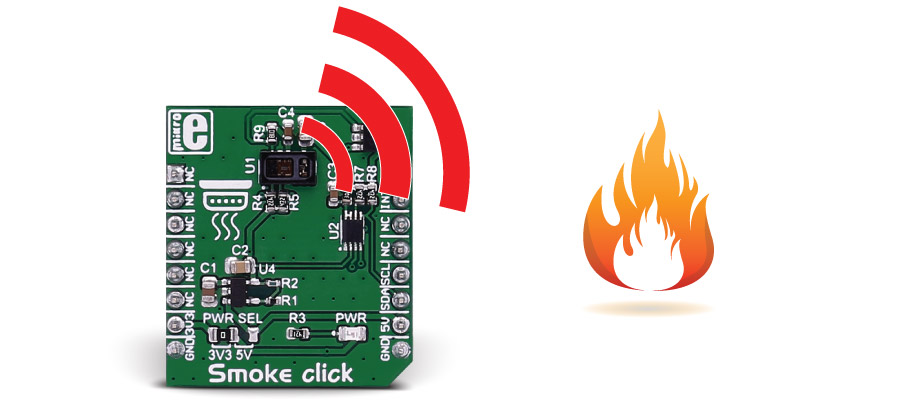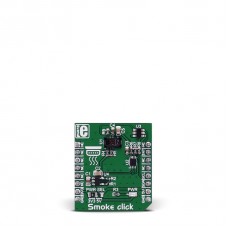Smoke click
Smoke click carries the MAX30105 high-sensitivity optical sensor for smoke detection. The click is designed to run on either 3.3V or 5V power supply. It communicates with the target MCU over I2C interface with additional functionality provided by the INT pin on the mikroBUS™ line.

MAX30105 sensor features
The MAX30105 is an integrated particle-sensing module. It includes internal LEDs, photodetectors, optical elements, and low-noise electronics with ambient light rejection. The sensor can detect a wide variety of smoke particle sizes.
The MAX30105 also has an on-chip temperature sensor for calibrating the temperature dependence of the particle sensing subsystem. The temperature sensor has an inherent resolution 0.0625°C.
Power consumption
Power supply current in Shutdown mode is typically 0.7μA. The module can be shut down through software with zero standby current, allowing the power rails to remain powered at all times.
Building an IoT smoke detection device
Adding WiFi connectivity to your smoke detection sensor is always a good idea. You can get a message as soon as the level of smoke goes over the set threshold. For example, Smoke click and WiFi ESP click together would do that job wonderfully.
Specifications
| Type | Optical |
| Applications | Smoke detection, fire alarms |
| MCU | MAX30105 high-sensitivity optical sensor for smoke detection |
| Key Features | Ultra-low Shutdown current (0.7μA, typ), excellent ambient rejection capability, integrated cover glass for optimal, robust performance |
| Interface | I2C,GPIO |
| Input Voltage | 3.3V or 5V |
| Compatibility | mikroBUS |
| Click board size | S (28.6 x 25.4 mm) |
Pinout diagram
This table shows how the pinout on Smoke click corresponds to the pinout on the mikroBUS™ socket (the latter shown in the two middle columns).
Programming
Code examples for Smoke click, written for MikroElektronika hardware and compilers are available on Libstock.
Code snippet
This snippet initializes the system and the Smoke click board, sets the module in MultiLED mode, reads and shows data on UART.
01 void main( void )
02 {
03 system_init();
04 smoke_init();
05 smoke_set_registers_default();
06
07 while ( true )
08 {
09 smoke_read_data();
10 uart_show();
11 Delay_ms( 1000 );
12 }
13 }
Downloads
mikroBUS™ Standard specificationMAX30105 datasheet
Smoke click schematic
Enter the code in the box below:










